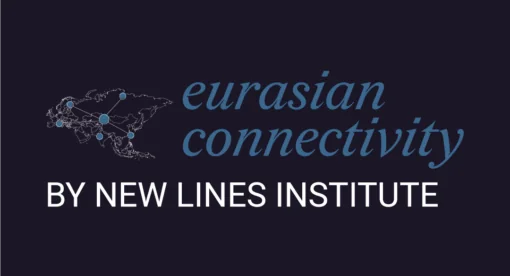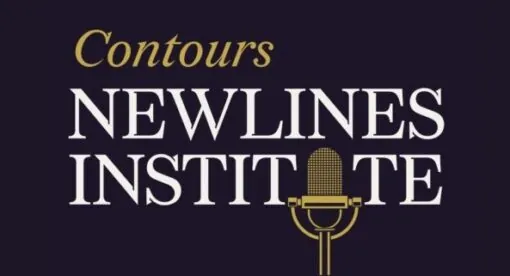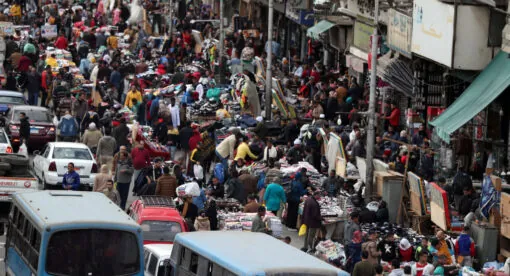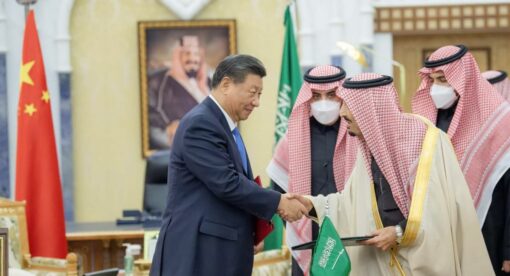In this segment of the Contours podcast series, Nicholas Heras is joined by Eugene Chausovsky, Senior Analyst at the New Lines Institute for Strategy and Policy and a globally recognized expert on Russia, the post-Soviet states, and Eurasia, to discuss Russia’s potential emerging strategy to annex breakaway territories in several post-Soviet states. The discussion dives into the implications of Chausovsky’s most recent essay in Foreign Policy, “Russia May Be Ready to Annex Breakaway Territories,” and what the U.S. policy response should be to countering Russia’s annexation approach. Heras and Chausovsky also debate whether Ukraine can accept former U.S. Secretary of State Henry Kissinger’s assertion that Ukraine should give up some of its territory to Russia in exchange for long-term peace.
Nicholas Heras: Hello, everyone. Thank you for joining us for today’s segment of the New Lines Institute for Strategy and Policy’s Contours podcast series. My name is Nick Heras, and I’m joined today by Eugene Chausovsky. Eugene is a senior analyst here at the New Lines Institute for Strategy and Policy. He’s also a globally recognized expert on Eurasia, Russia, and the post-Soviet states. Eugene recently wrote a provocative essay for Foreign Policy magazine, where he argued the Russia’s President Vladimir Putin may turn to formally annexing various breakaway territories in the former Soviet states as a means to try to make an argument to the Russian people that he is in fact winning the war in Ukraine.
NH: Eugene, thank you for joining us today. Okay. Eugene, I want to start our discussion off by asking you what motivated you to write this essay?
EC: Thanks, Nick. So essentially in following the unfolding events in the Ukrainian conflict, I just started to notice a lot of different rumblings or speculation, if you will, about different territories, both within Ukraine but also in the broader former Soviet space that were hinting towards some kind of referendum for annexation by Russia or some kind of unique Russian moves to hold a more direct control over this territory. So I started to look into this issue both historically and in more contemporary times, connecting the dots and realized that there may be an emerging political shift here on the part of Russian strategy over this conflict.
NH: So could you define for us what that shift is and what led to it being adopted?
EC: Yeah, absolutely. I think it’s important to give a brief history lesson, if you will, on these so-called breakaway territories. A lot of these emerged in the wake of the collapse of the Soviet Union, and essentially we saw these countries that were going in a more independent direction from Russia, in a pro-Western direction, countries like Ukraine, Moldova, Georgia, that had these pockets within these countries, these newly independent states that were trying to remain aligned with Russia, or at least were wanting some kind of autonomy. That led to these so-called breakaway territories where they weren’t formally annexed by Russia, but they were outside of the control of the host governments. So in the case of Georgia, that was the regions of Abkhazia and South Ossetia, which became breakaway territories. We saw this happen in Transnistria in Moldova in the early ’90s, and then in Ukraine more recently in the 2014 conflict and following the Euromaidan Revolution, this happened in the Eastern Ukrainian territories, which we now see as kind of major conflict zones.
EC: So essentially what Russia was doing there was holding unofficial control, if you will, or unofficial support of these breakaway territories both as leverage over the host governments that were trying to align with the West and basically to prevent their integration with the EU and especially NATO. So it was this sort of gray zone that served Russia’s interests. But I think the change that I’ve identified that has emerged, or potential shift in recent months following Russia’s full-scale invasion of Ukraine is that that may no longer serve Russia’s interest, that sort of indirect gray zone control because while it was giving Russia some leverage with these countries and with the West, relations are now at an all-time low. These countries have now fully gone in the Western direction. The West has passed major sanctions against Russia. So it may be in Russia’s interest to a certain extent, or at least seen by Putin and the Kremlin, to no longer be ambiguous about these territories and just go for a full-scale annexation at least of certain ones in these regions.
NH: Can you break down for us basically what the dynamics are in these regions? I know we have to take almost a case-by-case basis because of how upsetting formal Russian annexation might be to the international order. As you mentioned, Eugene, Russia’s under immense sanctions pressure. How, if you were sitting in the Kremlin, would you view the lowest hanging fruit for annexation and why?
EC: Yeah, that’s a great question. I think the natural starting point here is in Ukraine itself, right? Because we have the ongoing conflict and that’s the hottest place right now. So we’re seeing DPR and LPR, the Donetsk People’s Republic, and Luhansk People’s Republic. These were the trigger point for the war itself. These are now talking about an annexation, the local leadership by Russia, if and when Russia is able to not reclaim, but essentially take over these territories completely militarily. We’re seeing that in the process right now. Russia certainly has faced, I think, more significant resistance from the Ukrainian forces than it had expected, but nevertheless, it is making some progress there, capturing Mariupol, for example, recently, now trying to kind of swallow the rest of Luhansk and Donetsk oblasts.
EC: We also see Russia doing similar things in Kherson Oblast, which is just north of Crimea. We’ve seen some rumblings there of pro-Russian local leadership calling for annexation, the ruble being introduced and things of that nature, passports being distributed. These are precursors, I think, to some kind of political move being taken. And this can happen, I think, as soon as in the coming months. One date that’s been floated around is in early September when Russia holds regional elections, that this can be kind of paired with that for the Donbas and Eastern Ukraine and Kherson in Southern Ukraine to make that formal move. So I would expect that to be the most likely area or the most likely regions to go for that Russian annexation approach.
NH: So it’s interesting because what you just outlined for us, Eugene, is of immense importance. As everyone knows, there has been a lot of discussion lately about, okay, what is the end goal for the counter-Russian effort in Ukraine? We’re seeing more and more here in Washington, D.C., A discussion of, okay, United States supporting Ukraine at the hilt. It’s organizing an international effort to punish Russia through sanctions and other measures, but fundamentally Russia is still capturing territory in Southern and Eastern Ukraine. Although Ukraine has fought valiantly, and its partners and allies have stood by it, there is this sort of question of, okay, indefinitely, where does this end?
NH: We are seeing in the recent exchange between sort of this august figure of U.S. Foreign policy in Henry Kissinger, but his statement that Ukraine should consider giving up territory to Russia in exchange for peace, and Ukrainian President Volodymyr Zelensky’s to rebuttal to that, as well as rebuttals to Kissinger here in the United States, that there is this question of can you actually end this conflict with anything short of the withdrawal of Russian forces, at least from the pre-Feb. 24, 2022 line of contact. Or more maximally, do you have to push Russia out of all Ukrainian territory, including Crimea, that has been taken since 2014? And this is becoming a live discussion here in Washington, D.C. It ties very much into what you wrote, Eugene, in your essay for Foreign Policy magazine.
NH: We’ve discussed this, and we’ve written this together with other colleague, Caroline Rose, in an analysis that we produced in March about Russia’s counterinsurgency position in Ukraine. This idea that the Russians would try to create a series of political realities backed up by a pervasive security regime to try to hold onto this territory we can call Novorossiya in Ukraine. So I want to ask you, if Putin makes this move, and if there’s a policy mood inside Washington, in Kiev, and in Europe to push Putin back, what are the implications for a Russian Novorossiya land grab inside Ukraine?
EC: Yeah, I think you’ve identified some really important points there, Nick. I think anytime you’re talking about territorial transfers as part of a negotiation process, that gets really tricky, politically speaking. As you mentioned, Zelensky has said that essentially Ukraine will not be doing what Kissinger suggested, which is acknowledging or accepting Russian control over territory that it has seized, whether in this conflict or going back to 2014 with Crimea and Eastern Ukraine.
EC: But at the same time, I think Putin has proven that he is not the kind of leader that’s willing to give major concessions like that. So we’re in this very difficult position where essentially it’s part of the negotiations, but essentially it’s going to be settled, I think, more or less on the battlefield, and you have to kind of create realities there. So when we’re looking at the potential for, let’s say, Ukraine to reclaim territory, I don’t think it’s very likely at least under the current Russian government, that it’s going to be able to negotiate that diplomatically. So then you get into the military option and then you get into the question of ability, capabilities, logistics, things of that nature.
EC: So this emerging shift that I’ve identified in terms of Russia’s potential recognition of these breakaway territories or annexation of them is essentially a hardening of the Russian position, so making official what is already the de facto reality, which is that Russia is in control of these territories, militarily speaking, and here I’m talking about Eastern Ukraine and now parts of Southern Ukraine that collectively make up Novorossiya, as you mentioned. So were Russia to make that annexation move, that’s essentially completely taking it off the table. Whereas right now, at least theoretically, it is a subject of negotiation, but it’s going to require, I think, a combination of military capabilities on the Ukrainian side backed up by the West to reclaim these territories and then some kind of diplomatic negotiations that go alongside that. But I don’t see the diplomatic replacing or as an alternative to the military dynamics that we’re seeing unfold right now.
NH: This is an interesting dynamic because there’s a lot of attention focused on Ukraine. There’s also increased attention being focused on Transnistria and the potential for an expansion of the Ukraine conflict into the heart of the Eastern flank of NATO via Transnistria. I’ve always viewed Transnistria as sort of a Kaliningrad type of situation where Russia could in theory annex it and pack more nuclear-capable weapons there, but it’s sort of to do an outright annexation would be a source of significant destabilization, potentially in some ways, perhaps more than even Putin would want. I wanted to ask you because you’ve, I believe, traveled to Transnistria and you know the ground there as you know the ground in Eastern Ukraine intimately as well. What is your sense of the dynamics there?
EC: That’s a great question. So I think you rightfully point out Transnistria as a very important component of this conflict, albeit in an indirect way. But I think from traveling to Transnistria, what really stuck out to me was how close it is geographically to Ukraine. I remember being in Odesa, which has emerged as a very important stronghold on the Ukrainian side in this conflict, and it was merely about an hour ride away to get to the outskirts of Transnistria. So it’s geographically, this is, I should mention that Transnistria is this breakaway sliver territory between Ukraine and Moldova, which is controlled by essentially pro-Russian forces and backed by Russian troops. So it was almost as if I was kind of entering into another world, even though it was just an hour outside of what is a very important city in Ukraine from Odesa.
EC: Essentially it feels like you’re back in the Soviet Union. You have Russian flags alongside the local Transnistria flags. You have a bust of Lenin in front of the Transnistrian parliament building. So it’s really kind of a throwback and almost a different universe, but it’s a very small territory as well, and one that’s disconnected from Russian forces. So when you bring up the potential for annexation there, I agree that it’s not quite as straightforward as you would have in areas of Eastern Ukraine or Southern Ukraine. First of all, because it’s not contiguous to any Russian-controlled territory, at least as of right now, which makes Odesa so important for Ukraine. So to hold out Russian control there. So that’s a logistical challenge. Even politically, I mean, this points to the nuances of this conflict. You had the local leader, the so-called self-appointed president of Transnistria, state last month that no referendums are being planned at this moment, and any information that suggests such is not true.
EC: But I think that depending on how the Ukraine conflict plays out on the ground militarily, the Ukraine has been able to successfully resist that sort of western push by Russian forces. So they’re kind of holed up in that Crimea and Kherson territory, even as they focused on Eastern Ukraine. If for whatever reason Russia was able to break through, I think that would make the Transnistria referendum perhaps a more of an open question. But right now, yes, I do think that it’s much less likely to go that route for a number of different reasons than, say, Donetsk, Luhansk, or Kherson.
NH: Thank you, Eugene. I want to pivot a bit to the Caucasus because there’s been increasing mentions of Georgia and the Russian-Georgian disputes in South Ossetia, which has a natural sort of connection to North Ossetia in Russia, the main Russian Federation. And of course, Abkhazia, which based on some of the prominent European news channels that have sent documentarians to Abkhazia, they always seem to get out of the way first, “This is bad. Russia shouldn’t have done that. Oh, but by the way, this place is super cool. It might be worth visiting some day.” So I want to ask you, what is the status right now with South Ossetia and Abkhazia, and if Putin decided to formally annex those territories, what would be the logic and what would be the gain for him and his regime?
EC: I think the status currently, these are less active. These are the frozen conflict territories that are frequently mentioned. So we had, back in 2008, a major conflict between Russia and Georgia where Russia essentially was able to recognize these territories as independent states, but it didn’t take the move to annex them. While there are occasional security incidents that do happen for the most part, it’s largely frozen in terms of a hot conflict. So that’s why I think there’s less of a momentum behind a political change to these territories because Russia does negotiate with Georgia, even as Tblisi is trying to get closer to the West. So it’s not as adversarial of a relationship as Russia has had in Ukraine in recent years, although there are certain tentions there.
EC: So what kind of raised an eyebrow for me is actually the outgoing South Ossetian presidents actually called for a referendum to be held on this very issue, basically for Russia to annex South Ossetia in July. But this has actually led to an interesting reaction because both Russia and the new president, which is now coming into power, who actually defeated the president that called for this referendum, are a lot more measured on this issue, I would say. Basically they’re talking about this is this needs to be studied legally. There’s a lot of things that have to happen for a seed of such a referendum, which to me shows that there’s maybe not that kind of political momentum on either the Russian side or the breakaway territory side themselves for annexation. But the fact that it is even being brought up, I think, is notable in light of the current geopolitical climate.
EC: But as you said, these are territories that have been kind of in place for a long time and absent that active military conflict, it is possible for journalists or even for regular people to visit them kind of like I did with Transnistria a few years ago. So it just goes to show that not all of these breakaway territories are created equal.
NH: My final question for you, Eugene, is let’s say you get the opportunity to sit in front of President Biden and his team at the White House. They read your essay in Foreign Policy magazine, found it provocative. What is the takeaway you’d like them to have from it?
EC: Given all of the events that have happened recently and the moves that Russia is taking, or at least the indications of at the very least in Ukraine, but perhaps outside of Ukraine, that Russia is basically looking to consolidate its position in these territories, and that it’s really digging in for a prolonged standoff, not only in Ukraine, but also with the West in general.
EC: So if I were speaking to the Biden administration about this, I would say that what the U.S. Should do is to shore up its support for these pro-Western governments that Russia is basically trying to undermine. So obviously in the case of Ukraine, but also Moldova and Georgia, these are states that have had made some important strides towards Western integration. They’re not getting the EU and NATO membership that they want, but that still does not preclude some real functional integration and increased U.S. support for these countries, whether that’s economically, in the security sphere. So really backing these pro-Western governments as they’re coming under greater pressure from Russia.
EC: Then in addition to that, making sure that its own alliance system in the region is robust and consolidated. I think that the U.S. is already taking moves in that direction. I think this kind of explains why we’ve seen this more momentum behind the expansion of NATO to Finland and Sweden, which are much more ready countries, I think, to join the alliance than states like Ukraine and Moldova that have these active, or at least somewhat frozen conflicts in their territory. So it’s really basically just shoring up these allies in the region to make sure that they’re more ready to withstand Russian pressure and even potentially Russian military action.
NH: Thank you very much, Eugene. And thank you everyone for joining us. We will continue here at the Newlines Institute for Strategy and Policy to monitor, research, and analyze and provide policy recommendations for the U.S. and its partners and allies focused on Russia, Putin’s attempt to remodel the Russian regime, the post-Soviet states, the greater Eurasia. All the best.
Although transcription is largely accurate, there could be some inaccuracies due to inaudible passages or transcription errors.







